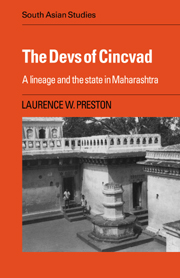Book contents
- Frontmatter
- Contents
- List of figures and tables
- Preface
- List of abbreviations and note on Indian technical usages
- Introduction: an inamdar lineage in Indian history
- PART ONE THE INAMDAR UNDER THE MARATHAS
- PART TWO THE INAMDAR UNDER THE BRITISH
- 3 Introduction to Part Two
- 4 From ritual grandee to state pensioner: varsasans and the Morgav pilgrimage
- 5 An inamdar's domain: Cincvad and the commerce of Pune-Haveli
- 6 The genesis and operation of the Inam Commission
- 7 Claiming an inheritance: the Inam Commission and the Cincvad Samsthan
- 8 Conclusion: an inamdar's rights and the authority of the state
- Bibliography
- Index
- CAMBRIDGE SOUTH ASIAN STUDIES
4 - From ritual grandee to state pensioner: varsasans and the Morgav pilgrimage
from PART TWO - THE INAMDAR UNDER THE BRITISH
Published online by Cambridge University Press: 05 November 2011
- Frontmatter
- Contents
- List of figures and tables
- Preface
- List of abbreviations and note on Indian technical usages
- Introduction: an inamdar lineage in Indian history
- PART ONE THE INAMDAR UNDER THE MARATHAS
- PART TWO THE INAMDAR UNDER THE BRITISH
- 3 Introduction to Part Two
- 4 From ritual grandee to state pensioner: varsasans and the Morgav pilgrimage
- 5 An inamdar's domain: Cincvad and the commerce of Pune-Haveli
- 6 The genesis and operation of the Inam Commission
- 7 Claiming an inheritance: the Inam Commission and the Cincvad Samsthan
- 8 Conclusion: an inamdar's rights and the authority of the state
- Bibliography
- Index
- CAMBRIDGE SOUTH ASIAN STUDIES
Summary
Varsasans were annual cash allowances from the Maratha state to its subjects. With this largess the state particularly favored priests and other divines, astrologers, magicians, and scholars; hence the varsasan was largely, though not completely, a brahman allowance. It sustained the high culture of the country, and the incomes were often a sort of social welfare for the indigent but ritually superior members of society. But the recipients of allowances rendered a valuable service to the state: by accepting an allowance they acknowledged the legitimacy of the Peshva's government. The allegiance of what were considered the influential members of society was assured. Supported for reasons in equal measure political and cultural, the presence of numerous recipients of small cash allowances was a characteristic feature of the Hindu state.
After the conquest the British, as successors to the Marathas, assumed the support of the ritual elite and took the place of the Peshva in the relations of subject and state. However, seeing varsasans as either indiscriminate charity or the cash equivalent of landed inam, the Company's officers sought to bring order to a mass of trifling payments through the formulation of fixed rules. Most of the miscellaneous varsasans held by the Dev of Cincvad, the Samsthan, or members of junior lineage segments were settled as a matter of course under the general regulations to be here considered.
- Type
- Chapter
- Information
- The Devs of CincvadA Lineage and the State in Maharashtra, pp. 92 - 121Publisher: Cambridge University PressPrint publication year: 1989

